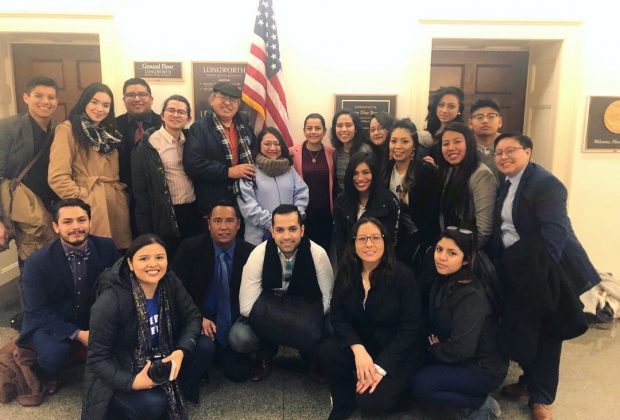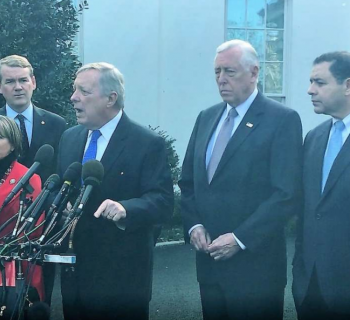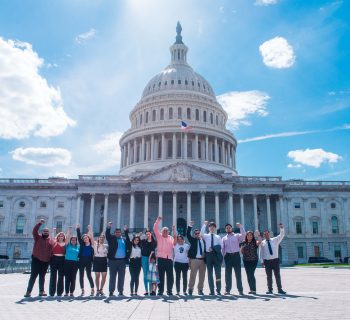By: Araceli Martinez Ortega~La Opinion~March 3, 2019
They demand that the authorization of international trips be reopened for reasons of emergency, study or employment, and they want details of the change of policy…
Around 66 federal lawmakers have signed letters to the Secretary of Homeland Security, Kirstjen Nielsen, to urgently call upon the government to restore the ability of Dreamers to travel abroad.
The letter from Congressman Alan Lowenthal, signed by 46 members of Congress, asks DHS that the beneficiaries of Deferred Action for Childhood Arrivals (DACA) receive a permit to travel out of the country (advance parole) while litigation continues in the courts to define the future of the program that has benefited more than 800,000 young people with a work permit and avoids their deportation.
The DACA program was approved by President Obama in the summer of 2012, but in September of 2017, President Trump canceled it. Before the cancellation, the beneficiaries were allowed to request permission to travel outside the country.
Although in January 2018, the federal courts ordered to keep the DACA current for the current beneficiaries, the Trump administration has not reinstated the beneficiaries' capacity to request a permit to travel abroad for humanitarian reasons, employment or study purposes.
As a result of this policy, Dreamers have not been able to visit their sick family members and have been denied study and employment opportunities that would change their lives.
DHS has responded to previous requests from Congress, saying that they cannot comment on these policies due to pendinglawsuits surrounding the DACA.
"While this is happening, thousands of DACA beneficiaries remain unable to travel outside of the United States when a court decision is not expected for a year or more," the congressmen said in the letter.
They ask Secretary Nielsen to reconsider the issue in light of the damage caused to DACA beneficiaries, by denying them permission to travel abroad.
And they cite the benefit that the advance parole brought to the DACA beneficiary students in California and the country that have participated in the study abroad program offered by the California-Mexico Studies Center that originated at Cal State University in Long Beach.
Last month, a group of dreamers went to Washington, DC to advocate for the reinstatement of Advance Parole, official permission to travel abroad and return if problems to the US.
PHOTO: PHOTO SUPPLIED BY THE CALIFORNIA-MEXICO STUDIES CNTER, INC.
On the other hand, next March 12 will be the deadline that senators Kamala Harris and Dianne Feinstein and a large group of senators gave to DHS to respond to their request to reopen the advance parole for the DACA.
"Why are the DACA beneficiaries being treated differently when they apply for a permit to travel abroad," the senators questioned.
And they ask for figures of the total number of applications received and approved between 2012 and 2018, as well as the regulations under which they are guided to approve a petition, the risks involved in making international trips, written documentation about the change of policies regarding the advance parole as of September 2017.
Dario Guerrero Meneses is a Dreamer who studied at Harvard College, and who has experienced what it is like to leave the country with an educational advance parole in 2013; and then again in 2014, leaving the country without any authorization due to a family emergency.
"The first time I went without problems with an advance parole due to a study trip. The second time I had to take my mother to Tijuana to receive cancer treatment. I waited three months, but since they did not give it to me, I could not wait any longer and we had to go", he recalls. Dario who had come at the age of two years old to the United States, practically self-deported when leaving without a travel permit.
Dario's mother died in Mexico a month after they left the country. It took four months for him to be allowed to return after a fight that won national headlines, and a whole year to get his DACA status again.
"Hundreds of thousands of Dreamers will continue to have family emergencies, and opportunities for study and work abroad, we will have to face the difficult decision to stay or leave. Either option prevents us from contributing as much as possible to this country", said Dario.
Source: Araceli Martinez Ortega~La Opinion~March 3, 2019
________________________________________________________________________
Congresistas y senadores presionan por permisos de viaje para dreamers
Por: Araceli Martinez Ortega~La Opinion~Marzo 3,2019
Alrededor de 66 legisladores federales han enviado cartas a la secretaría de Seguridad de la Nación, Kirstjen Nielsen para hacerle un llamado urgente a restablecer la capacidad de los dreamers de viajar al exterior.
La carta del congresista Alan Lowenthal firmada por 46 miembros del Congreso, solicita al DHS que los beneficiarios de la Acción Diferida para los Llegados en la Infancia (DACA) reciban un permiso para viajar fuera del país (en inglés advance parole) en tanto el litigio continúa en las cortes para definir el futuro del programa que ha beneficiado a más de 800,000 jóvenes con un permiso para trabajar y evita su deportación.
El DACA fue aprobado por el presidente Obama en el verano de 2012, pero en septiembre de 2017, el presidente Trump lo canceló. Antes de la cancelación, se permitía a los beneficiarios, solicitar permisos para viajar fuera del país.
Pese a que 2017, las cortes federales ordenaron mantener vigente el DACA para los actuales beneficiarios, la administración Trump no ha reinstalado la capacidad de los beneficiarios para solicitar un permiso para viajar al exterior por razones humanitarias, empleo o propósitos de estudio.
Como resultado de esta política, los dreamers no han podido visitar a sus familiares enfermos y se le ha negado oportunidades de estudio y empleo que cambiarían sus vidas.
El DHS ha respondido a peticiones previas del Congreso, diciendo que no pueden comentar sobre estas políticas debido a las demandas pendientes en torno al DACA.
“Mientras eso ocurre, miles de beneficiarios de DACA permanecen impedidos de viajar fuera de los Estados Unidos cuando no se espera una decisión de la corte por un año o más”, dicen los congresistas en la carta.
Le piden a la secretaria Nielsen, reconsiderar el tema a la luz del daño que se causa a los beneficiarios de DACA al negarles el permiso para viajar al exterior.
Por otra parte, el próximo 12 de marzo se cumplirá el mes de plazo que le dieron las senadoras Kamala Harris y Dianne Feinstein y un amplio grupo de senadores, al DHS para que dé una respuesta a su petición de reabrir el advance parole para los DACA.
“Por qué se está tratando diferente a los beneficiarios de DACA cuando solicitan un permiso para viajar fuera”, cuestionan los senadores. Y le piden números del total de solicitudes recibidas y aprobadas entre 2012 y 2018 así como los reglamentos bajo los que se guían para aprobar una petición, y de los riesgos que implica para ellos hacer viajes internacionales. De igual modo, le piden documentación por escrito sobre el cambio de políticas sobre el advance parole a partir de septiembre de 2017.
Dario Guerrero Meneses es un dreamer que estudió en Harvard College, que ha experimentado lo que es salir del país con un advance parole en 2013; y luego de nuevo en 2014, dejar el país sin ninguna autorización debido a una emergencia familiar.
“La primera vez salí sin problemas con un advance parole debido a un viaje de estudios. La segunda vez tenía que llevar a mi madre a Tijuana para que recibiera un tratamiento de cáncer. Esperé tres meses, pero como no me lo dieron, no pude esperar más y tuvimos que ir”, recuerda. Dario quien había venido a los dos años a los Estados Unidos, prácticamente se autodeportó al salir sin un permiso de viaje.
La madre de Dario murió en México un mes después de que salieron del país. A él le tomó cuatro meses que lo dejaran regresar después de una lucha que acaparó titulares nacionales; y todo un año para obtener de nuevo su DACA.
“Cientos de miles de dreamers vamos a seguir teniendo emergencias familiares, y oportunidades de estudio y trabajo en el exterior, tendremos que tomar la decisión difícil de quedarnos o irnos. Cualquiera de ellas nos impide contribuir al máximo con este país”, remarca Dario.
Fuente: Araceli Martinez Ortega~La Opinion~Marzo 3,2019






